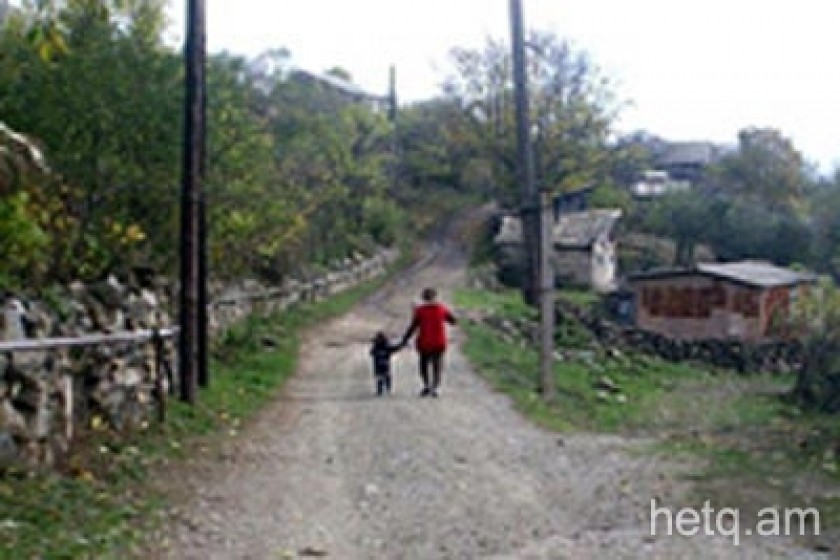
Where is the Wheat the Government Provided?
We were the first people to inform the head of the Bazum village administration in the Lori Marz about the winter wheat the government had provided as aid to his village.
“You called me up and that was the first I heard of it,” said Bazum's Vanik Pluzyan. About 500 kilograms of winter wheat had been provided to the village of Bazum to mitigate the effects of this year's drought, according to documents provided by the regional administration of the Lori Marz. But the grain actually never actually reached the village. Even if it had, it would have failed to make up for losses suffered in the drought because the village hasn't grown wheat for more than three years now. The last time they grew wheat was 2002, according to Vanik Pluzyan. At present, farmers grow alfalfa instead of wheat on 70 hectares of arable land.
“Then how did it happen that you appeared on the regional administration list?”
The village mayor had no answer to this question.
An interdepartmental commission was established according to a July 14 resolution of the Prime Minister of the Republic of Armenia and the regional administrations were instructed to present to that commission within ten days a list of the villages in their regions that been affected by the lengthy drought and water shortage. The list was to include details on the specific crops affected.
Surprisingly, a village in which no wheat was grown hence no wheat was lost to the drought was on the list submitted to the commission by the governor of the Lori Marz. The surprise of the village mayor only increased when, after he heard from unofficial sources about the 500 kilograms of wheat provided to his village, he called the nearby village of Aznvadzor and found out that his college also was also in some confusion. Aznvadzor was also on the list of drought-afflicted communities in line for winter wheat distribution, according to information from the regional administration, and in fact was provided with 1,400 kiIograms of wheat. But the head of the Aznvadzor village administration said he had turned the aid down.
“Wheat doesn't yield a good harvest in this area. We haven't grown wheat since 2001,” said village mayor Sashik Shahnazaryan. “We sow 700 kilograms and harvest 1,000 kilograms.” He has asked the representative of regional administration to provide barley seeds to his village in spring instead of wheat.
“How sure are you that they will provide it?” we asked the mayor of Aznvadzor. “They will,” he replied. When we asked him how he had refused the government aid, the mayor answered that he just told to the agronomist from the governor's office without calling a session of the village administration or informing the villagers. Furthermore, Sashik Shahnazaryan didn't know what had become of the wheat that was earmarked for Aznvadzor.
4,300 kg of wheat was allocated to the village of Bovadzor according to information provided by the regional administration. Edward Meliksetyan, head of the Bovadzor administration was informed in advance. He said that they had been provided with 2,000 kilograms, i.e. 2,300 kg less than they were promised. The villagers in Bovadzor only recently received the winter wheat. However, Edward Meliksetyan said it was not too late. Everything depends on the weather.
The government provided a total of 254 tons of winter wheat to the regional administration of the Lori Marz. It was distributed among 39 communities. The village of Gulakarak got the most – 18,200 kilograms, and Bazum got the least – 500 kilograms, which never reached the village.
People in Bazum couldn't even remember who had last planted wheat. Like their mayor, they knew nothing about the winter wheat provided by the government. Potatoes are their main concern: first there was an unexpected frost earlier this year, and then the sun scorched the potatoes. The 400 kilograms of potatoes Aramayis Tsaturyan sowed yielded only 150 kilograms of small, poor quality potatoes.
“Nature conspired against the people of Lori this year,” Tsaturyan said. His neighbors are not pleased with the harvest, or with nature, either. Venera Papikyan compares this year's potatoes with pig fodder. “First rains and frost, then drought. I have decided not to grow anything from here on. We get nothing for our hard work.
The mayor of Bazum estimated this year's harvest at 50%. “The drought damaged the grass and potatoes. There is no single English walnut. Pear, apple, plums – all were damaged,” Vanik Pluzyan said.
The mayor of Bazum told the regional administration last spring about the damages suffered by the village.
“But no commission ever arrived at all. They [the regional administration] told us they had applied to the government and the government had provided that amount of wheat to the Lori Marz,” said mayor of Bazum pointing to the official letter from Lori regional administration that he was seeing saw for the first time.
 Videos
Videos Photos
Photos
Write a comment